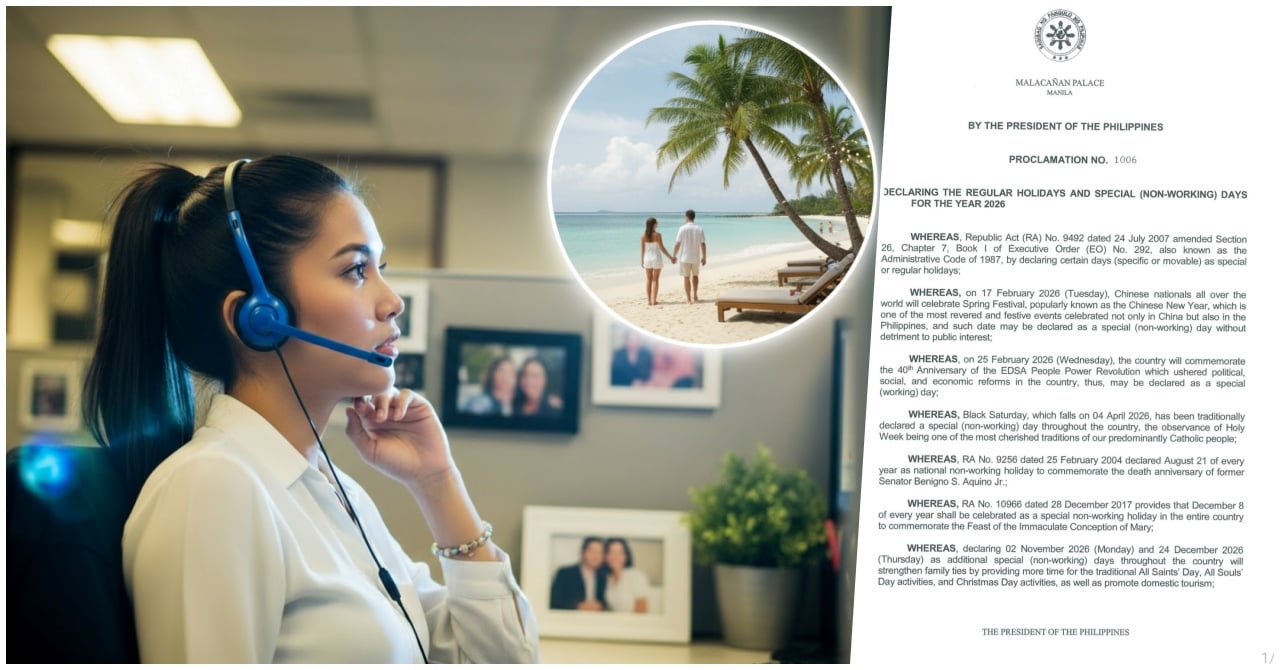Malacañang has released the official list of holidays for 2026 through Proclamation No. 1006, signed by President Ferdinand R. Marcos Jr. on September 3, 2025. The declaration identifies regular holidays, special (non-working) days, and additional special dates that will guide both the public and private sectors in planning work schedules and family activities for the year ahead.
The proclamation is anchored on existing laws, including Republic Acts 9492, 9256, 10966, 9177, and 9849, which mandate the observance of national holidays such as Eid’l Fitr, Eid’l Adha, and the Feast of the Immaculate Conception, as posted in the Official Gazette.

Regular Holidays
The following dates will be observed nationwide as regular holidays in 2026:
-
New Year’s Day – January 1 (Thursday)
-
Maundy Thursday – April 2
-
Good Friday – April 3
-
Araw ng Kagitingan – April 9 (Thursday)
-
Labor Day – May 1 (Friday)
-
Independence Day – June 12 (Friday)
-
National Heroes Day – August 31 (Last Monday of August)
-
Bonifacio Day – November 30 (Monday)
-
Christmas Day – December 25 (Friday)
-
Rizal Day – December 30 (Wednesday)
Special (Non-Working) Days
In addition to the above, these dates will be observed as special (non-working) days:
-
Ninoy Aquino Day – August 21 (Friday)
-
All Saints’ Day – November 1 (Sunday)
-
Feast of the Immaculate Conception of Mary – December 8 (Tuesday)
-
Last Day of the Year – December 31 (Thursday)
Special Working Day
The anniversary of the 1986 People Power Revolution, which falls on February 25 (Wednesday), has been declared a special working day.
Additional Special (Non-Working) Days
To allow Filipinos more time to observe long-standing traditions and family gatherings, the following dates were added as special non-working days:
-
Chinese New Year – February 17 (Tuesday)
-
Black Saturday – April 4
-
All Souls’ Day – November 2 (Monday)
-
Christmas Eve – December 24 (Thursday)
Islamic Holidays
The proclamation also notes that the dates of Eid’l Fitr and Eid’l Adha will be announced separately, based on the recommendations of the National Commission on Muslim Filipinos, after confirmation of the Islamic calendar.
Promoting Rest, Reflection, and Tourism
The Office of the President emphasized that the holiday declaration is meant not only to respect historical, religious, and cultural observances but also to strengthen family bonds and support domestic tourism. Holidays such as All Saints’ Day, All Souls’ Day, and Christmas Eve provide longer breaks for Filipinos to engage in both spiritual reflection and leisure travel.
The Department of Labor and Employment (DOLE) is tasked with issuing the implementing guidelines, particularly with regard to compensation rules for workers who report on these holidays.
The proclamation takes effect immediately and will be published in newspapers of general circulation.
Looking Ahead
With 2026’s holiday schedule already outlined, both employers and employees can better plan work arrangements, vacations, and observances for the year. The combination of fixed national holidays and flexible Islamic holidays reflects the country’s diverse cultural and religious traditions, ensuring that the calendar accommodates various communities across the Philippines.
